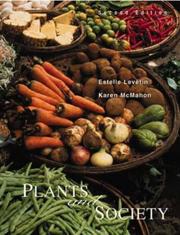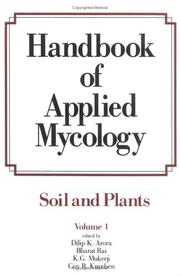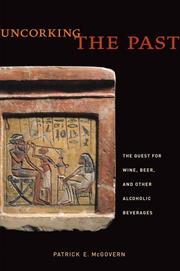| Listing 1 - 10 of 12 | << page >> |
Sort by
|
Multi
ISBN: 9780128157039 0128157038 9780128152713 0128152710 Year: 2019 Publisher: Duxford, United Kingdom : Woodhead Publishing,
Abstract | Keywords | Export | Availability | Bookmark
 Loading...
Loading...Choose an application
- Reference Manager
- EndNote
- RefWorks (Direct export to RefWorks)
Fermented Beverages, Volume Five, the latest release in The Science of Beverages series, examines emerging trends and applications of different fermented beverages, including alcoholic and non-alcoholic drinks. The book discusses processing techniques and microbiological methods for each classification, their potential health benefits, and overall functional properties. The book provides an excellent resource to broaden the reader's understanding of different fermented beverages. It is ideal for research and development professionals who are working in the area of new products.
Fermented beverages. --- Beverage industry --- Technological innovations. --- Equipment and supplies.
Book
ISBN: 0128157038 0128152710 9780128157039 9780128152713 Year: 2019 Publisher: Duxford, United Kingdom
Abstract | Keywords | Export | Availability | Bookmark
 Loading...
Loading...Choose an application
- Reference Manager
- EndNote
- RefWorks (Direct export to RefWorks)
Fermented beverages. --- Beverage industry --- Technological innovations. --- Equipment and supplies. --- Drink industry --- Food industry and trade --- Bottling --- Beverages --- Fermented foods
Book
Year: 1993 Publisher: Liège : A. Degive,
Abstract | Keywords | Export | Availability | Bookmark
 Loading...
Loading...Choose an application
- Reference Manager
- EndNote
- RefWorks (Direct export to RefWorks)
Alimentation --- Boissons alcoolisees --- Fermented beverages --- Fabaceae --- Ethnobotany --- Fabaceae --- Brewing industry --- Beverage plants --- Beers --- Fermentation --- Afrique --- Africa --- Amylases --- Cultivation
Book
ISBN: 3038974323 3038974315 Year: 2019 Publisher: MDPI - Multidisciplinary Digital Publishing Institute
Abstract | Keywords | Export | Availability | Bookmark
 Loading...
Loading...Choose an application
- Reference Manager
- EndNote
- RefWorks (Direct export to RefWorks)
Yeasts are truly fascinating microorganisms. Due to their diverse and dynamic activities, they have been used for the production of many interesting products, such as beer, wine, bread, biofuels, and biopharmaceuticals. Saccharomyces cerevisiae (brewers’ or bakers’ yeast) is the yeast species that is surely the most exploited by humans. Saccharomyces is a top-choice organism for industrial applications, although its use for producing beer dates back to at least the 6th millennium BC. Bakers’ yeast has been a cornerstone of modern biotechnology, enabling the development of efficient production processes. Today, diverse yeast species are explored for industrial applications. This Special Issue “Yeast Biotechnology 2.0” is a continuation of the first Special Issue, “Yeast Biotechnology” (https://www.mdpi.com/books/pdfview/book/324). It compiles the current state-of-the-art of research and technology in the area of “yeast biotechnology” and highlights prominent current research directions in the fields of yeast synthetic biology and strain engineering, new developments in efficient biomolecule production, fermented beverages (beer, wine, and honey fermentation), and yeast nanobiotechnology.]
bioethanol production --- mead --- nanobiotechnology --- fermentation-derived products --- flavor --- citric acid production --- enzyme production --- non-Saccharomyces yeasts --- fermented beverages --- bioreactors --- Saccharomyces cerevisiae --- wine --- beer
Book
ISBN: 8132227980 8132228006 Year: 2016 Publisher: New Delhi : Springer India : Imprint: Springer,
Abstract | Keywords | Export | Availability | Bookmark
 Loading...
Loading...Choose an application
- Reference Manager
- EndNote
- RefWorks (Direct export to RefWorks)
Asia has a long history of preparation and consumption of various types of ethnic fermented foods and alcoholic beverages based on available raw substrates of plant or animal sources and also depending on agro-climatic conditions of the regions. Diversity of functional microorganisms in Asian ethnic fermented foods and alcoholic beverages consists of bacteria (Lactic acid bacteria and Bacillus species, micrococcii, etc.), amylolytic and alcohol-producing yeasts and filamentous moulds. Though there are hundreds of research articles, review papers, and limited books on fermented foods and beverages, the present book: Ethnic Fermented Foods and Alcoholic Beverages of Asia is the first of this kind on compilation of various ethnic fermented foods and alcoholic beverages of Asia. This book has fifteen chapters covering different types of ethnic fermented foods and alcoholic beverages of Asia. Some of the authors are well-known scientists and researchers with vast experiences in the field of fermented foods and beverages who include Prof. Tek Chand Bhalla, Dr. Namrata Thapa (India), Prof. Yearul Kabir and Dr. Mahmud Hossain (Bangladesh), Prof. Tika Karki (Nepal), Dr. Saeed Akhtar (Pakistan), Prof. Sagarika Ekanayake (Sri Lanka), Dr. Werasit Sanpamongkolchai (Thailand), Prof. Sh. Demberel (Mongolia), Dr. Yoshiaki Kitamura, Dr. Ken-Ichi Kusumoto, Dr. Yukio Magariyama, Dr. Tetsuya Oguma, Dr. Toshiro Nagai, Dr. Soichi Furukawa, Dr. Chise Suzuki, Dr. Masataka Satomi, Dr. Kazunori Takamine, Dr. Naonori Tamaki and Dr. Sota Yamamoto (Japan), Prof. Dong-Hwa Shin, Prof. Cherl-Ho Lee, Dr. Young-Myoung Kim, Dr. Wan-Soo Park Dr. Jae-Ho Kim (South Korea) Dr. Maryam Tajabadi Ebrahimi (Iran), Dr. Francisco B. Elegado (Philippines), Prof. Ingrid Suryanti Surono (Indonesia), Dr. Vu Nguyen Thanh (Vietnam). Researchers, students, teachers, nutritionists, dieticians, food entrepreneurs, agriculturalist, government policy makers, ethnologists, sociologists and electronic media persons may read this book who keep interest on biological importance of Asian fermented foods and beverages.
Chemistry. --- Microbiology. --- Food --- Nutrition. --- Food Science. --- Applied Microbiology. --- Biotechnology. --- Fermented foods --- Fermented beverages --- Food, Fermented --- Beverages --- Food science. --- Microbial biology --- Biology --- Microorganisms --- Alimentation --- Nutrition --- Health --- Physiology --- Diet --- Dietetics --- Digestion --- Food habits --- Malnutrition --- Science --- Health aspects --- Food—Biotechnology. --- Nutrition .
Book
ISBN: 9811514860 9811514852 Year: 2020 Publisher: Singapore : Springer Singapore : Imprint: Springer,
Abstract | Keywords | Export | Availability | Bookmark
 Loading...
Loading...Choose an application
- Reference Manager
- EndNote
- RefWorks (Direct export to RefWorks)
This book provides detailed information on the various ethnic fermented foods and beverages of India. India is home to a diverse food culture comprising fermented and non-fermented ethnic foods and alcoholic beverages. More than 350 different types of familiar, less-familiar and rare ethnic fermented foods and alcoholic beverages are traditionally prepared by the country’s diverse ethnic groups, and include alcoholic, milk, vegetable, bamboo, legume, meat, fish, and cereal based beverages. Most of the Indian ethnic fermented foods are naturally fermented, whereas the majority of the alcoholic beverages have been prepared using dry starter culture and the ‘back-sloping’ method for the past 6,000 years. A broad range of culturable and unculturable microbiomes and mycobiomes are associated with the fermentation and production of ethnic foods and alcoholic drinks in India. The book begins with detailed chapters on various aspects including food habits, dietary culture, and the history, microbiology and health benefits of fermented Indian food and beverages. Subsequent chapters describe unique and region-specific ethnic fermented foods and beverages from all 28 states and 9 union territories. In turn the classification of various ethnic fermented foods and beverages, their traditional methods of preparation, culinary practices and mode of consumption, socio-economy, ethnic values, microbiology, food safety, nutritional value, and process optimization in some foods are discussed in details with original pictures. In closing, the book addresses the medicinal properties of the fermented food products and their health benefits, together with corresponding safety regulations. .
Food—Biotechnology. --- Microbiology. --- Nutrition . --- Food Science. --- Food Microbiology. --- Nutrition. --- Applied Microbiology. --- Alimentation --- Food --- Nutrition --- Health --- Physiology --- Diet --- Dietetics --- Digestion --- Food habits --- Malnutrition --- Microbial biology --- Biology --- Microorganisms --- Health aspects --- Fermented beverages. --- Beverages --- Fermented foods

ISBN: 0697345521 Year: 1999 Publisher: Boston, MA ; London : WCB/McGraw-Hill,
Abstract | Keywords | Export | Availability | Bookmark
 Loading...
Loading...Choose an application
- Reference Manager
- EndNote
- RefWorks (Direct export to RefWorks)
ETHNOBOTANY --- PLANT CELLS --- PLANT ANATOMY --- PLANT PHYSIOLOGY --- LIFE CYCLES --- PLANTS --- FOOD PLANTS --- PLANT GENETICS --- PLANT SYSTEMATICS --- ECONOMIC PLANTS --- CAFFEINE --- HERBS --- SPICES --- MEDICINAL PLANTS --- POISONOUS PLANTS --- FUNGI --- FUNGI --- FUNGI --- ERGOT --- EDIBLE FUNGI --- ANTIBIOTICS --- MYCOTOXINS --- HALLUCINOGENIC FUNGI --- MEDICAL MYCOLOGY --- FIBRE PLANTS --- WOOD --- PAPERS --- ALLERGENIC PLANTS --- MONOGRAPHS --- HUMAN NUTRITION --- ENVIRONMENT --- FERMENTED BEVERAGES --- FERMENTED FOOD

ISBN: 0824783808 9780824783808 0824784359 9780824784355 082478491X 9780824784911 0824785010 9780824785017 0824785517 9780824785512 Year: 1991 Publisher: New York M. Dekker
Abstract | Keywords | Export | Availability | Bookmark
 Loading...
Loading...Choose an application
- Reference Manager
- EndNote
- RefWorks (Direct export to RefWorks)
Fungal diseases of plants. --- Mycorrhizas. --- Phytopathogenic fungi --- Wood-decaying fungi. --- Biological control. --- Mycorrihizae --- Wood-decaying fungi --- Fungal diseases of plants --- Fungal plant diseases --- Fungous diseases of plants --- Plant mycoses --- Mycoses --- Plant diseases --- Plants --- Decay fungi, Wood --- Wood --- Wood decay fungi --- Wood-destroying fungi --- Wood fungi --- Wood-rotting fungi --- Fungi --- Trees --- Biological control --- Effect of mycotoxins on --- Diseases and pests --- Microbiology --- Deterioration --- Carcinogenesis. --- Ecology. --- FUNGI --- FOOD DETERIORATION --- MOLDS --- FEEDS --- DETERIORATION --- MUSHROOMS --- BIOTECHNOLOGY --- FERMENTED BEVERAGES --- FERMENTED FOOD --- CULTIVATION --- UTILIZATION --- Aflatoxin --- Biosynthesis --- Genetic information --- Mycotoxins --- Toxicity --- MEDICAL MYCOLOGY --- ENTOMOGENOUS FUNGI --- HUMANS --- PARASITIC FUNGI --- NEMATOPHAGOUS FUNGI --- WOOD DESTROYING FUNGI --- PESTICIDES --- BIODEGRADATION --- MATHEMATICAL MODELS --- MYCORRHIZAS

ISBN: 1282359908 9786612359903 0520944682 9780520944688 0520253795 9780520253797 9781282359901 9780520267985 0520267982 6612359900 Year: 2009 Publisher: Berkeley : University of California Press,
Abstract | Keywords | Export | Availability | Bookmark
 Loading...
Loading...Choose an application
- Reference Manager
- EndNote
- RefWorks (Direct export to RefWorks)
In a lively tour around the world and through the millennia, Uncorking the Past tells the compelling story of humanity's ingenious, intoxicating quest for the perfect drink. Following a tantalizing trail of archaeological, chemical, artistic, and textual clues, Patrick E. McGovern, the leading authority on ancient alcoholic beverages, brings us up to date on what we now know about how humans created and enjoyed fermented beverages across cultures. Along the way, he explores a provocative hypothesis about the integral role such libations have played in human evolution. We discover, for example, that the cereal staples of the modern world were probably domesticated for their potential in making quantities of alcoholic beverages. These include the delectable rice wines of China and Japan, the corn beers of the Americas, and the millet and sorghum drinks of Africa. Humans also learned how to make mead from honey and wine from exotic fruits of all kinds-even from the sweet pulp of the cacao (chocolate) fruit in the New World. The perfect drink, it turns out-whether it be mind-altering, medicinal, a religious symbol, a social lubricant, or artistic inspiration-has not only been a profound force in history, but may be fundamental to the human condition itself.
Alcoholic beverages --- Drinking of alcoholic beverages --- Alcohol consumption --- Alcohol drinking --- Alcohol use --- Alcoholic beverage consumption --- Consumption of alcoholic beverages --- Drinking problem --- Liquor problem --- Social drinking --- Alcoholism --- Temperance --- Intoxicants --- Alcohol --- Beverages --- History. --- Social aspects. --- Boissons alcoolisées --- Consommation d'alcool --- History --- Histoire --- Aspect social --- agrarian society. --- alcohol history. --- alcoholic beverages. --- anthropology. --- archaeology. --- cacao. --- coffee table book. --- corn beer. --- creation of alcohol. --- evolution. --- fermented beverages. --- fermenting. --- food and sociology. --- food and wine. --- food history. --- gastronomy. --- history of alcohol. --- human condition. --- liquid courage. --- mead. --- millet. --- modern world. --- provocative hypothesis. --- religious symbol. --- rice wine. --- role of alcohol in society. --- search for booze. --- social lubricant. --- sorghum. --- spirits.
Book
Year: 2020 Publisher: Basel, Switzerland MDPI - Multidisciplinary Digital Publishing Institute
Abstract | Keywords | Export | Availability | Bookmark
 Loading...
Loading...Choose an application
- Reference Manager
- EndNote
- RefWorks (Direct export to RefWorks)
Yeasts are truly fascinating microorganisms. Due to their diverse and dynamic activities, they have been used for the production of many interesting products, such as beer, wine, bread, biofuels and biopharmaceuticals. Saccharomyces cerevisiae (bakers’ yeast) is the yeast species that is surely the most exploited by man. Saccharomyces is a top choice organism for industrial applications, although its use for producing beer dates back to at least the 6th millennium BC. Bakers’ yeast has been a cornerstone of modern biotechnology, enabling the development of efficient production processes for antibiotics, biopharmaceuticals, technical enzymes, and ethanol and biofuels. Today, diverse yeast species are explored for industrial applications, such as e.g. Saccharomyces species, Pichia pastoris and other Pichia species, Kluyveromyces marxianus, Hansenula polymorpha, Yarrowia lipolytica, Candida species, Phaffia rhodozyma, wild yeasts for beer brewing, etc. This Special Issue is focused on recent developments of yeast biotechnology with topics including recent techniques for characterizing yeast and their physiology (including omics and nanobiotechnology techniques), methods to adapt industrial strains (including metabolic, synthetic and evolutionary engineering) and the use of yeasts as microbial cell factories to produce biopharmaceuticals, enzymes, alcohols, organic acids, flavours and fine chemicals, and advances in yeast fermentation technology and industrial fermentation processes.
Technology: general issues --- coffee processing --- coffee fermentation --- starter culture --- coffee beverage --- yeast --- Icewine --- Saccharomyces cerevisiae --- hyperosmotic stress --- CRISPR-Cas9 --- glycerol transport --- STL1 --- brewing --- Cyberlindnera --- NABLAB --- non-alcoholic beer --- non-conventional yeast --- non-Saccharomyces yeast --- response surface methodology --- Ustilago --- itaconic acid --- process improvement --- lignocellulosic feedstock --- yeasts --- grape --- federweisser --- wine --- microbiota identification --- MALDI-TOF MS Biotyper --- Torulaspora delbrueckii --- craft beer --- microbrewery plant --- mixed fermentation --- aroma profile --- strain collection --- aroma profiling --- gas chromatography --- wine yeast --- Saccharomyces --- fermentation --- volatile aroma compounds --- Simultaneous inoculation --- Alcoholic fermentation --- Malolactic fermentation --- Sacccharomyces cerevisiae --- Oenococcus oeni --- PN4TM --- OmegaTM --- Aroma profile --- antioxidant --- coffee --- W. anomalus --- industrial brewer’s strains --- adaptive laboratory evolution (ALE) --- snowflake phenotype --- beer fermentation --- wine yeasts --- lactic acid bacteria --- co-inoculation --- sequence inoculation --- flavor compounds --- color pigments --- cell printing --- piezoelectric dispensing --- GFP-tagged yeast clone collection --- living cell microarrays --- microfluidic chip --- dynamic single-cell analysis --- Candida albicans --- adhesion --- fibronectin --- nanomotion --- atomic force microscope (AFM) --- xylose metabolism --- genetic engineering --- biofuel --- Spathaspora passalidarum --- Pichia stipitis --- volatile organic compounds --- proton-transfer reaction-mass spectrometry --- Metschnikowia pulcherrima --- flavor --- non-Saccharomyces yeasts --- fermentation-derived products --- fermented beverages --- beer --- coffee bean fermentation --- itaconic acid production --- bioethanol production --- bioreactors --- yeast micro- and nanobiotechnology
| Listing 1 - 10 of 12 | << page >> |
Sort by
|

 Search
Search Feedback
Feedback About
About Help
Help News
News